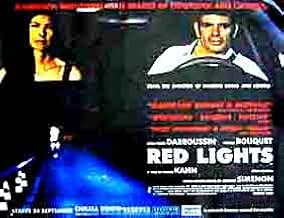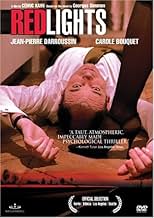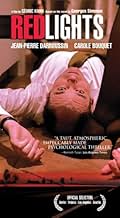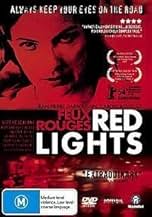IMDb रेटिंग
6.6/10
3.2 हज़ार
आपकी रेटिंग
अपनी भाषा में प्लॉट जोड़ेंA cross-country trip turns out to be a nightmare for a troubled couple.A cross-country trip turns out to be a nightmare for a troubled couple.A cross-country trip turns out to be a nightmare for a troubled couple.
- पुरस्कार
- 2 कुल नामांकन
फ़ीचर्ड समीक्षाएं
Red Lights does not disappoint for artful cinematic tension, mining the rich resources of the French thriller -- no one can craft a thriller like the French. As the story unfolds, the viewer is driven increasingly into unease by the movie's primary conceit: the sudden unraveling of the milquetoast male lead before and then during a road trip into the country (in the throng of traffic during French vacation season) to pick up the couple's kids from camp. This ultimately has disastrous consequences for both husband and wife, despite their separating early in the story.
There are very effective touches here, unique to the French thriller. I especially liked Kahn's fearless willingness to run a protagonist straight into the ground so we can watch him grossly err and see him swerve into disaster, a risk most American directors wouldn't have the guts to take. He infuriates us and we are in total fear for him all at the same time. I also liked the way that Kahn can imbue simple sequences, like a series of phone calls, with utter tension.
What I did not like was the encroachment of pat, storytelling elements. The resolution is purely canned, and in particular there is one coincidence in the movie that is so Hollywood -- so Jerry Bruckheimer -- that it made me wince in embarrassment. It almost seems that, at the end, another director altogether stepped in to take the helm.
Red Lights is definitely worth seeing, but Kahn should have stayed the course with his somber, bold storytelling, rather than chickening out as he did. A good movie that could have easily been better.
There are very effective touches here, unique to the French thriller. I especially liked Kahn's fearless willingness to run a protagonist straight into the ground so we can watch him grossly err and see him swerve into disaster, a risk most American directors wouldn't have the guts to take. He infuriates us and we are in total fear for him all at the same time. I also liked the way that Kahn can imbue simple sequences, like a series of phone calls, with utter tension.
What I did not like was the encroachment of pat, storytelling elements. The resolution is purely canned, and in particular there is one coincidence in the movie that is so Hollywood -- so Jerry Bruckheimer -- that it made me wince in embarrassment. It almost seems that, at the end, another director altogether stepped in to take the helm.
Red Lights is definitely worth seeing, but Kahn should have stayed the course with his somber, bold storytelling, rather than chickening out as he did. A good movie that could have easily been better.
The first few seconds of 'Feux Rouges' show Antoine - a mid-age Parisian insurance agent - writing a loving mail to his wife on the verge of a family vacation. The last few seconds of the movie show the couple exchanging loving smiles while driving to the South where they would pick the children from a camp to continue together the vacation. Everything goes wrong in the in-between.
'Feux Rouges' starts as a relationship drama and turns into a thriller and a wrong-turn movie. It is inspired by a novel of the Georges Simenon, and as many of Simenon's novels the characters are far from being great communicators. The lack of communication, the routine and maybe the differences in social positions make of Antoine an unhappy husband who is ready to spoil the start of the vacations by heavy drinking while on road. Much of the movie happens on the road, and the gradual tension building picking with the disappearance of the wife Helen strikes a cord of uneasiness and even claustrophobia - great achievement for a film filmed on highways and roads with the sky almost permanently on view. As in many of Simenon's novels there is a moralistic twist, and justice is made even if it is completely the result of hazard and not of the will of men. And there is a huge price to pay for this justice, which we only can guess as it happens out of the screen and story time.
Director Cedric Kahn has learned a few lessons in thrillers from the great masters, and fist of all from Hitchcock. Antoine is wonderfully played by Jean-Pierre Darroussin as the type of character that we know from the very first moment that he will get into trouble and he indeed does all to confirm this, but it is the character of Helene played by Carole Bouquet that he relates to all the time and who is his focal point of frustration, worry and love.The simplicity of the story telling, the careful gradation of tension towards horror, the low key ending which does not solve the conflict, but just postpones it beyond the duration of the screening make of this film a worth watching piece of cinema.
'Feux Rouges' starts as a relationship drama and turns into a thriller and a wrong-turn movie. It is inspired by a novel of the Georges Simenon, and as many of Simenon's novels the characters are far from being great communicators. The lack of communication, the routine and maybe the differences in social positions make of Antoine an unhappy husband who is ready to spoil the start of the vacations by heavy drinking while on road. Much of the movie happens on the road, and the gradual tension building picking with the disappearance of the wife Helen strikes a cord of uneasiness and even claustrophobia - great achievement for a film filmed on highways and roads with the sky almost permanently on view. As in many of Simenon's novels there is a moralistic twist, and justice is made even if it is completely the result of hazard and not of the will of men. And there is a huge price to pay for this justice, which we only can guess as it happens out of the screen and story time.
Director Cedric Kahn has learned a few lessons in thrillers from the great masters, and fist of all from Hitchcock. Antoine is wonderfully played by Jean-Pierre Darroussin as the type of character that we know from the very first moment that he will get into trouble and he indeed does all to confirm this, but it is the character of Helene played by Carole Bouquet that he relates to all the time and who is his focal point of frustration, worry and love.The simplicity of the story telling, the careful gradation of tension towards horror, the low key ending which does not solve the conflict, but just postpones it beyond the duration of the screening make of this film a worth watching piece of cinema.
The first thing to take note in Red Lights is that the story is not rushed: Antoine (Jean-Pierre Darrousin) is perhaps a passive-aggressive, or maybe just having a mid-life crisis. He and his wife Helene are planning for a trip to pick up the kids from summer camp. But the drive hits some things in the way- he has a beer and a whiskey before leaving; a traffic jam gets to Antoine; he drinks again at a roadside; he and his wife bicker; he drinks again; she leaves, and once he realizes he can't catch up with her, he decides to have a night with a little more drinking ahead. While he says he doesn't drink too often ("two, three times a year", he says), this night is different. Especially with a fugitive somewhere out on the loose, as the radio says.
Cedric Kahn is a skilled and trust-worthy director (via France) for a few reasons in dealing with his latest film Red Lights. He doesn't make the pace in the tenser scenes (with a couple of juicy exceptions) really quick cut like in a choppy Hollywood piece. He brings an interesting blend of visuals with the city and the roads, the cars, then as it grows darker outside, the lights outside become key. When Antoine awakes the next morning on the roadside, he's out in the country. As well, he has a great blend of music from Debusy, whom I may have heard before this film but never recognized. It's a fascinating element to add with the impending doom of the film's story. But the key thing that the director can do for a film is the right casting, and here's it's impeccable in dealing with the three leads. Jean-Pierre Darrousin is terrific at conveying the mind-set of this husband in a rocky relationship. Then in the second and third acts, despite what he's doing on the road, he keeps consistent in keeping as the film's reluctant hero. Credit should also be given to first-time actor Vincent Deniard, who is perfect at being the "quiet one you got to watch". And Carole Bouquet is a fair counterpart to a Darrosin.
Although the denouement starts to drag, for my money the film's main chunk doesn't. It would be one thing if Antoine just got drunk. But there's also a good interest in the talking points with the character, as he decides to blow his mind in the process. Red Lights is definitely an art-house film that won't please everyone (the film ends rather realistically, without the kind of extra bit American audiences might want that's more intimate here), but it's still very compelling.
Cedric Kahn is a skilled and trust-worthy director (via France) for a few reasons in dealing with his latest film Red Lights. He doesn't make the pace in the tenser scenes (with a couple of juicy exceptions) really quick cut like in a choppy Hollywood piece. He brings an interesting blend of visuals with the city and the roads, the cars, then as it grows darker outside, the lights outside become key. When Antoine awakes the next morning on the roadside, he's out in the country. As well, he has a great blend of music from Debusy, whom I may have heard before this film but never recognized. It's a fascinating element to add with the impending doom of the film's story. But the key thing that the director can do for a film is the right casting, and here's it's impeccable in dealing with the three leads. Jean-Pierre Darrousin is terrific at conveying the mind-set of this husband in a rocky relationship. Then in the second and third acts, despite what he's doing on the road, he keeps consistent in keeping as the film's reluctant hero. Credit should also be given to first-time actor Vincent Deniard, who is perfect at being the "quiet one you got to watch". And Carole Bouquet is a fair counterpart to a Darrosin.
Although the denouement starts to drag, for my money the film's main chunk doesn't. It would be one thing if Antoine just got drunk. But there's also a good interest in the talking points with the character, as he decides to blow his mind in the process. Red Lights is definitely an art-house film that won't please everyone (the film ends rather realistically, without the kind of extra bit American audiences might want that's more intimate here), but it's still very compelling.
Director Cedric Kahn's "Red Lights" alternates between bright day and scary night. Antoine Dunand (Jean-Pierre Darrousin) is an insurance company employee who may enjoy a decent salary but he feels outclassed, and is out-earned I'm sure, by his corporate attorney spouse, Helene (Carole Bouquet). They have a nice, urban apartment and two young kids, a boy and a girl, both at camp eagerly awaiting pickup by their parents.
Antoine feels neglected by Helene, actually hated, and he even half-suspects her time with fellow male employees goes beyond business. He consoles himself with beer and scotch, preferably one after the other. He's clearly becoming, if he isn't already, an alcoholic.
The two leave to pick up their children from a distant camp. It's holiday-making time in France and the highways are jammed. An impatient Antoine, infuriated by the crawl, takes two successive detours, one off the main highway, the other for several refuelings at on-the-way bars. His driving becomes increasingly erratic, his wife's complaints more provocative. Eventually she realizes he's not just driving poorly, he's getting progressively more smashed. An argument ensues interrupting the classical music on their radio. Her anger at his driving is a coda for their growing estrangement. And then a bulletin announces a dangerous criminal has broken prison and is on the loose.
Recognizing that Antoine is really loaded and he won't yield the car keys, Helene runs off while her husband is knocking down scotch, leaving a note that she'll take a train.
Antoine is excessively upset at finding Helene missing-though befogged by booze, he also probably recognizes his own weirdness. Setting off to intercept her train he accepts a morosely quiet hitchhiker (Vincent Deniard), a fellow who offers no name but guess who he really is (hint above).
The film now enters a dark and isolated countryside where Antoine, despite his towering blood alcohol level, becomes justifiably afraid of his mostly silent young passenger.
The ride becomes a trip to terror for Antoine who sobers up enough to know he better master a deteriorating and life-threatening situation. Having done that he hunts for his wife. To tell more would be to spoil an original, well-acted story about fairly ordinary people who have let their marriage grow stale for all the usually mundane reasons that presage a relationship crisis.
The three main characters make "Red Lights," a title that superficially is about Antoine's reckless disregard of traffic signals but actually spotlights the warnings we receive and often ignore about impending personal crises, work. Largely unknown outside of French cinema, all three well-experienced and effective lead actors keep the viewer glued to the screen.
Compared to the current star vehicle hit, "Collateral," "Red Lights" carries forward true, outstanding noir drama by focusing on the straying from safe paths of ordinary people in common situations.
9/10
Antoine feels neglected by Helene, actually hated, and he even half-suspects her time with fellow male employees goes beyond business. He consoles himself with beer and scotch, preferably one after the other. He's clearly becoming, if he isn't already, an alcoholic.
The two leave to pick up their children from a distant camp. It's holiday-making time in France and the highways are jammed. An impatient Antoine, infuriated by the crawl, takes two successive detours, one off the main highway, the other for several refuelings at on-the-way bars. His driving becomes increasingly erratic, his wife's complaints more provocative. Eventually she realizes he's not just driving poorly, he's getting progressively more smashed. An argument ensues interrupting the classical music on their radio. Her anger at his driving is a coda for their growing estrangement. And then a bulletin announces a dangerous criminal has broken prison and is on the loose.
Recognizing that Antoine is really loaded and he won't yield the car keys, Helene runs off while her husband is knocking down scotch, leaving a note that she'll take a train.
Antoine is excessively upset at finding Helene missing-though befogged by booze, he also probably recognizes his own weirdness. Setting off to intercept her train he accepts a morosely quiet hitchhiker (Vincent Deniard), a fellow who offers no name but guess who he really is (hint above).
The film now enters a dark and isolated countryside where Antoine, despite his towering blood alcohol level, becomes justifiably afraid of his mostly silent young passenger.
The ride becomes a trip to terror for Antoine who sobers up enough to know he better master a deteriorating and life-threatening situation. Having done that he hunts for his wife. To tell more would be to spoil an original, well-acted story about fairly ordinary people who have let their marriage grow stale for all the usually mundane reasons that presage a relationship crisis.
The three main characters make "Red Lights," a title that superficially is about Antoine's reckless disregard of traffic signals but actually spotlights the warnings we receive and often ignore about impending personal crises, work. Largely unknown outside of French cinema, all three well-experienced and effective lead actors keep the viewer glued to the screen.
Compared to the current star vehicle hit, "Collateral," "Red Lights" carries forward true, outstanding noir drama by focusing on the straying from safe paths of ordinary people in common situations.
9/10
8=G=
"Red Lights", a subtitled French film, spends it's 1.75 hour run following Antoine (Darroussin) and his wife Hélène (Bouquet) as they leave Paris for a night drive to Bordeaux to pick up their kids. What should have been an ordinary road trip turns into an extraordinary series of events which will leave the couple forever changed. The less you know about these events prior to viewing the better as any hint of what happens could lead to a case of mistaken genre and spoilage. This film is a human drama which doesn't attempt to entertain with extremes but rather opts to engross with a slowly seductive tale of intrigues kept to realistic proportion. "Red Lights" relies heavily on the ability to identify with the adult married couple and the problems they encounter and, therefor, will play best with mature adult audiences. A nicely managed, methodical and very believable film which spends most of its time with Darroussin, "Red Lights" received good marks from critics and public alike and is well worth a look by mature viewers into French flicks. (B+)
क्या आपको पता है
- गूफ़At the beginning of the movie, the main characters meet at a cafe in the late afternoon. They then go home and get ready to travel to Bordeaux to pick up their kids. On the trip to Bordeaux, they are stuck in heavy traffic. Although it is now early evening, the vertical shadows cast by the cars indicate that the traffic scenes were shot at mid-day.
- कनेक्शनEdited into Le documentaire culturel: Le siècle de Simenon (2014)
- साउंडट्रैकNuages
from "Nocturnes"
Written by Claude Debussy
Performed by Etienne Baudo and LOrchestre de l'Opéra national de Paris
Conducted by Manuel Rosenthal
टॉप पसंद
रेटिंग देने के लिए साइन-इन करें और वैयक्तिकृत सुझावों के लिए वॉचलिस्ट करें
- How long is Red Lights?Alexa द्वारा संचालित
विवरण
- रिलीज़ की तारीख़
- कंट्री ऑफ़ ओरिजिन
- आधिकारिक साइट
- भाषाएं
- इस रूप में भी जाना जाता है
- Red Lights
- फ़िल्माने की जगहें
- Cléré les Pins, फ़्रांस(The garage where Antoine has his tyre changed.)
- उत्पादन कंपनियां
- IMDbPro पर और कंपनी क्रेडिट देखें
बॉक्स ऑफ़िस
- US और कनाडा में सकल
- $6,73,828
- US और कनाडा में पहले सप्ताह में कुल कमाई
- $3,202
- 22 अग॰ 2004
- दुनिया भर में सकल
- $23,94,429
- चलने की अवधि1 घंटा 45 मिनट
- रंग
- ध्वनि मिश्रण
- पक्ष अनुपात
- 1.85 : 1
इस पेज में योगदान दें
किसी बदलाव का सुझाव दें या अनुपलब्ध कॉन्टेंट जोड़ें






















